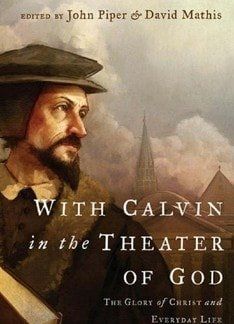With Calvin in the Theatre of God.
Eds John Piper and David Mathis
Crossway
192 Pages, £8.99
ISBN: 978-1433514128
Star rating: 5
This is a gem of a book, approaching Calvin’s life, ministry and contribution to the church from an unusual angle. Edited by John Piper and David Mathis, the book is a compilation of addresses given at the Desiring God 2009 National Conference. It takes its title from Calvin’s own description of life as ‘this magnificent theatre of heaven and earth replenished with numberless wonders,’ in which, as the Editors write, ‘we see God display for us his divine glory in all the hues and textures of daily life in redemptive history—and climactically in the life, death, and resurrection of our story’s Hero.’ Each of the six main contributors view Calvin’s life and work through this image and it all makes for a truly engaging and informative read.
In the first chapter, Julius Kim writes creatively, drawing fascinating parallels between the persecuted and pilgrim life of his own father and that of Calvin. “John Calvin was a faith-possessed pilgrim with a singular passion to know God and to make him known”, as a student and as a servant of God’s Word. Mark Talbot picks up the theatre motif but from a different angle, seeing human life ‘being acted out…by broken actors…on a broken stage, a stage strewn with the wreckage of sin and suffering. This makes our acting difficult and sometimes dangerous. We not only find all sorts of obstacles—all sorts of adversities, calamities, and horrors—strewn across the stage’s surface, but we also can never be sure that its floorboards are sound and that our feet will not break through as we take our next step, or that the whole surface will not suddenly shift cataclysmically with all of the accompanying damage to us and the overall environment.’ The purpose of the analogy is to reveal Calvin’s profound and realistic view of sin, evil and suffering. This is nitty gritty, ‘where-the-rubber-hits-the-road’ theology and I found it gripping.
Douglas Wilson turns to the ‘sacred script’ of the play, advocating that ‘Calvin worked out the principle of sola Scriptura more consistently than many of his fellow Reformers, and the implications were world shattering’. This is a no holds barred assault on liberal and higher critical views of Scripture – ‘The serpent was craftier than all the beasts of the field, having completed some post-doctoral work in Europe’ – and a call to bold, fearless preaching of the inspired, authoritative Scriptures. If you only read one chapter of this book, read this one!
Turning from the sacred to the secular, Marvin Olaskey looks at how Calvin challenged the conventional wisdom in the worlds of government and business. Sam Storms picks up Calvin’s own exhortation to a Christian in which he encourages her to ‘learn to have one foot raised to take our departure when it shall please God’, and shows how this characterised the Reformer’s own approach to life and how it should also characterise ours. There’s a wonderful exposition of 2 Corinthians 4:16-18 in among this and its one of the most pastoral sections of the book. John Piper concludes things in his own inimitable style, focussing on Christ as the ultimate expression and focus of the glory of God and the true theatre of God’s works of providence and grace.
I would suspect that however much – or little – you already know about Calvin, you will find much in this volume that will inform and inspire you. It goes a long way to correcting some of the false caricatures that abound about its subject and with its passion and pastoral concern cannot fail to stir the heart of all who read it. This is a ‘must read’ and I cannot commend it too highly.
John Brand,
The Faith Mission Bible College




